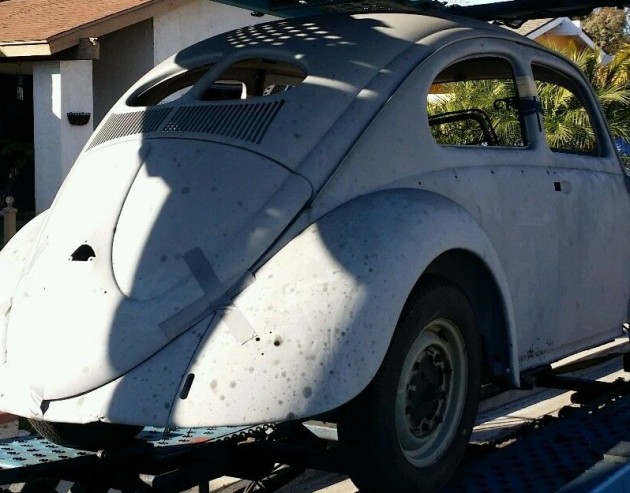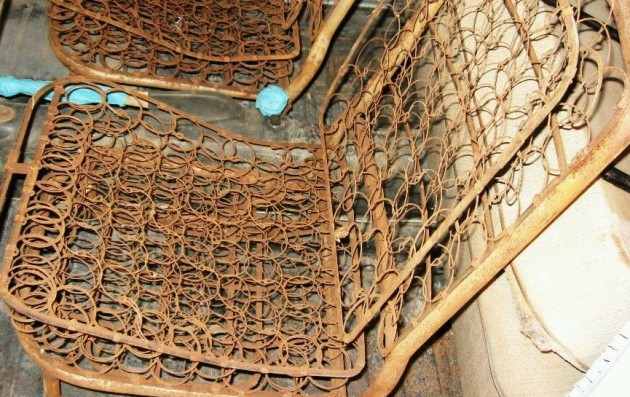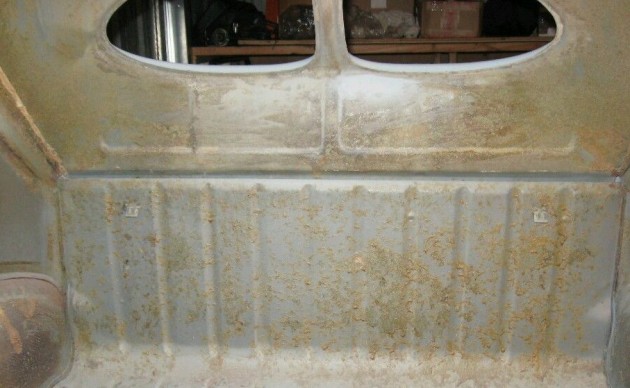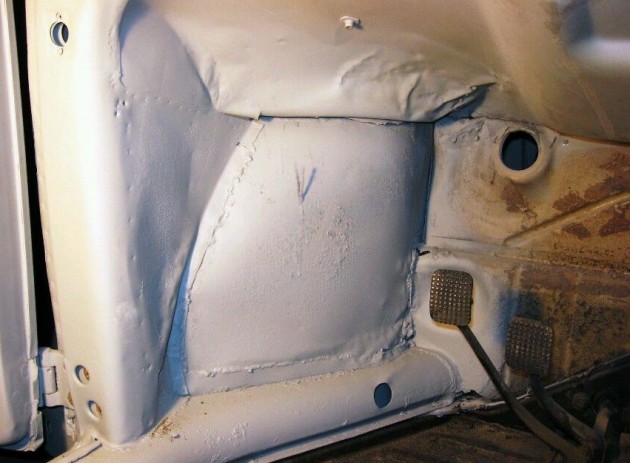
We just recently featured a split-window Beetle that’s got a hefty asking price on it; now, this one here on eBay is about half the price but twice the project as that car. These early VWs are desirable for their rarity and simply for being the initial models available stateside of what would become one of the most memorable vehicles on American roads for generations to come. This one goes a step further as it’s a genuine Zwitter, which was only made for about six months. The question is, does provenance and rarity matter when considering one of the most mass-produced vehicle ever made?

This photo is indicative of the level of work required to bring this special Beetle back to life. It looks like a fire swept through the interior, but it could also be due to prolonged period of exposure to the elements. This car is located in California, so perhaps it sat exposed to a desert climate. At this point, thinking about the amount of work involved, you may be asking yourself why a Zwitter is so special. Well, it has the split rear windows but the dashboard from an oval window car – while it may not amaze you, to the dedicated air-cooled fan, this is likely one of the rarest Bugs ever produced.

Here’s the other reason someone will take this restoration on: that tiny piece of metal that turns one window into two. Of course, there are other features synonymous with an early model, like the trick turn signals mounted in the B-pillars (known as semaphores for the unaware), unique rear tail lights and engine lid. So, to the seller’s credit, it sounds like he has at least tracked down some of the hard-to-find bits that will make the restoration of this split window easier. But I’m guessing due to the limited production run and the car’s disassembled state that there’s still more than a few parts missing that will be difficult to find. I’d be happy to proven wrong, however, and learn the seller has them all stashed away, carefully labeled and bagged up.

Here’s one of the accident-damaged areas the seller references in the ad on the driver’s front side. I’m not sure how you go about correcting this other than stripping the car down and starting over. Even though the other split-window Beetle we featured is more expensive, it could be worth it to not have to dive into correcting poorly-repaired accident damage. Then again, the availability of replacement parts and panels tends to make Beetle restoration fairly seamless, but who knows what variables exist in these hard-to-find early models. Which one would you choose?



I must say how amazed I am people will pay big money for these cars. Back in the day we deliberately blew them away for fun with our musclecars. We laughed at the hippies in all their glory but I guess everyone has their idea of a cool ride and I’m not the one to discourage them forking over thousands for a soup can on wheels which IMHO a Pinto / Vega/Gremlin would be a safer ride. Just my opinion and not meant to hurt anyone’s feelings.
I had a 67 1/2 model, the first year with 12V. Yes, everything that is said about the reliability and simplicity of these cars is absolutely true. These are cult cars and as such, there is no shortage of enthusiasts that will restore them, especially pre ’68 models.
JW, i would argue the point of safety because it really depends on what you deam safe. These cars are practically impossible to flip. Can be done but with much more effort than flipping a Pinto or a Vega (I had a ’74). In panic braking situation I would much rather be in a Beetle. Maybe if you run into a tree at full speed without braking your odds may be a little better in the US econoboxes but not by much.
The one truly unique thing is the dash. Otherwise, it was mostly a blending of the earlier and later models, thus Zwitter, or “hermaphrodite”.
And as for VWs, some of us wanted cars that would do more than accelerate quickly in a straight line. My (pre-import)squareback would “blow the doors off” lots of GI’s musclecars and earned us a bit of grocery money.
I had a ’68 bug in high school and one of my favorite memories was going out on a 20 degree morning and turning that key- knowing without a doubt it would start instantly. And knowing it would get me where I was going and back – unlike my Corvairs, which left me standing by the road many, many times.
Makes me miss my 1952 pointed windshield 356 continental coupe………I wonder what it would be worth today.
has 1 bid and the bidder has zero feedback. very interesting car, not sure if this or the other one is a better deal. nice find.
What people value is not rational. Look at diamonds. Basically useless in a domestic setting. But along with rubies, and emeralds, and others, some people, enough in fact, value them highly so there is a market for them.
Absolutely! Conversely we pollute our water and air and degrade the nutritional value of our food.
Mike from a junk collector show also has a 52 beetle that he wants for +$25000 and it is fully functional but, it is being sold as original. He acquired it from a guy that bought in Germany when he was in the Army. Still has green tags on it. It is mostly original but to drive a car of that age in Germany weather it was tagged German or US it had to meet current safety standards so the whole lighting and signal system had to be upgraded.
So there goes the originality. Any foreign car that is brought into the US must comply with safety standards. That in it’s self could cost you a fortune and then you would have to convert it back to originality. $$$$!
I’ve imported a large number of European cars into the US. While it’s true that you must make your vehicle comply with the FMVSS [Federal Motor Vehicle Safety Standards], this only applies to the specific year of manufacture. Since there were NO FMVSS regs until the 1964 seat belt & safety glass regs, bringing in a 1963 or earlier vehicle requires nothing be done.
If you bring in a 1968 or newer vehicle, it has to have side marker lights, headrests on the front seats, VIN plate at the base of the windshield, and a PVC valve on the engine. Plus items like the brake components have to be SAE approved.
In 1973 things started to become difficult, with many new FMVSS requirements coming into play, like the 5MPH bumpers. Even the windshield wiper arms had to be made dull, not bright polished stainless.
However there is an exemption to all this; if the vehicle is over 25 years old, you don’t have to do the conversions. You simply fill out the DOT and EPA exemption request forms!
But in Europe, the new EC vehicle regs coming out of Brussels are so damn restrictive that [for example] if the annual inspection finds even a slight trace of oil seeping from a seal or gasket under the car, a special oil absorbent “diaper” must be applied & wired onto the underside of the car!
Saturday 09 Jan @ 9pm and it is at $15,000 and reserve not met. (probably reserve is 20 to 25k) Spend 20 k at least redoing it and now you’re up to 40 +++
Maybe for Jay Leno as a business / collector investment but not for me or probably you…Just my opinion…..
“Practically impossible to flip…” not in my experience!
Not sure what’s impossible ?ive flipped many and made a good return on all of my investments
This Zwitter belongs to me…all original parts come with car..all tagged and bagged with original screws ,washers and yes even the rust on bolts is true to the car…seats are all there and original to car (cost of rear seat alone are upwards of 1500 if you can find them)i currently own 6 split windows and a few pre 63 doublecab trucks and always looking for more…Vws have been a huge passion for me..and split windows for those of you who know are an exceptional breed..I’ve built and sold many and the true enthusiasts have zero problem paying my asking price. .many have been sold to collectors in other countries. .now this Zwitter does need a full restoration and body work and paint..I’ve decided to keep her and show the world what is possible. ..stay tuned !!!
Gino,
I have a zwitter that’s being restored. One thing that seems to be
impossible to find is the interior light without the switch on the lens.
Do you know how to find one? I recently went to a VW show in LA
& saw a car with one. His was original but I’ve heard people are
making them. If you have any info I’d appreciate it.
Thanks
This is not a simple restoration in two obvious ways. First, the body must come off to repair it, and to inspect/repair the rolling chassis. Second, even though the car has a remarkable resemblance to later bugs, almost no parts interchange. Easy to find replacement items, say bumper over-riders for a ’67, are next to impossible to find for this car at any price! Rear tail light assemblies, pope’s nose, hood emblem, steering wheel, split case transmission parts, the list is a long one. And after you got it all done, the car sports a 36hp. engine with a stale air heating system and a no synch into low gear transmission. Still want one OEM?
My beloved vintage Volkswagens are the 1958 to early 1964 VW bugs and sunroof bugs, A.k.a. “the Herbie generation”. I owned a 1961, two sunroof 1962’s (one decked out like Herbie),and a 1963. The only “non-Herbie” generation bug I’ve owned was a 1966.
Wow ~
I had a two owner Zwitter sun roof and it fell between the cracks when my marriage failed in 1996 ~ I tried selling it for a few years with zero interest .
I think I got $3,000 for it with a fresh two tone paint job in the original pastel blue color .
Ca. car from new no less .
BTW : Zwitters didn’t have ‘pope nose’ license plate lights nor 36HP engines . they also used a one year only headlight switch .
Not many of us older VW Mechanics left I guess .
-Nate